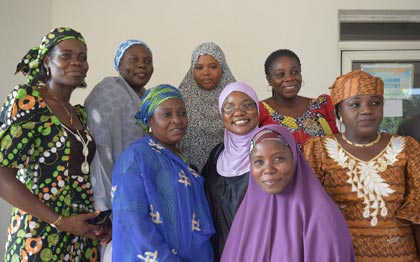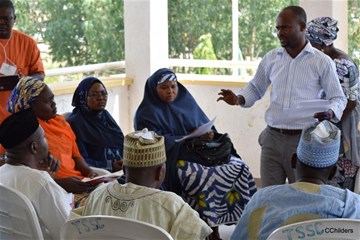In a time when Christians and Muslims in Nigeria are under attack from religious extremists, adherents to both faiths are working together to create greater unity in their communities.
The General Board of Church and Society worked with local church leaders to facilitate an event that brought 30 Christians and 30 Muslims together for training and dialogue at a youth conference hall in Jalingo, Taraba State.
Seventy-five percent of the United Methodists attending were from northern Nigeria, where Boko Haram has done significant damage, reported the Rev. Ande Emmanuel, a GBCS field organizer there. In that region, churches have been attacked on Sundays, and at least 50 United Methodists have died because of the violence, he said.
"It's not all Muslims attacking all Christians. It's a very small extremist sect of Muslims," the Rev. Clayton Childers, GBCS director of annual conference relations, said. "They are attaching Muslims as well as Christians. They don't like anybody who (does not hold) their extremist perspective."
Emmanuel has been working in areas affected by Boko Haram's attacks on Christians and moderate Muslims. Childers said Emmanuel has been "building bridges between the Muslim and Christian community in various settings, especially where United Methodists are strong."
 |
| Women participating in the conversations to build understanding between Christians and Muslims in Nigeria. |
"This particular event was intentionally designed…to talk about our respective faiths and how they support peace and community rather than the more violent passages that can be found in the Koran and our scriptures," Childers said.
"We had 22 imams participate," he said. "These are leaders in the Muslim communities, like pastors. We had three or four Muslim women, which is a huge deal."
Childers said the support the event receives had led him to believe this may be "a turning point. I've been working here 15 years and out of all the events I've led, this is the most exciting."
The Nigeria Episcopal Area has three annual conferences, which are home to about 458,000 United Methodists. Half of the nation's 170 million people are Muslim and 40 percent are Christian.
According to the Rev. Neal Christie, assistant general secretary for education and leadership formation at GBCS, the agency's long-term relationship with churches in Nigeria helped make the most recent peace-building efforts possible.
"More than a decade ago, we started doing Social Principles training in Nigeria," he said. "We've always received a very warm welcome there. We've spent a lot of time focusing on conflict-resolution skills, to build bridges where there have been some significant differences in opinion."
Building trust is critical to bringing peace, Christie said. "We have Muslim imams who trust us because we have been in their communities. They come to our Social Principals training."
Addressing these misunderstandings and finding common ground can be truly lifesaving, Emmanuel said.
Despite the violence that takes place in Nigeria, Christie said the church continues to do important work.
Emmanuel called for people in The United Methodist Church to align their lifestyles more fully with the messages of peace they preach.
Emily Snell, freelance writer living in Nashville, TN
One of seven apportioned giving opportunities of The United Methodist Church, the World Service Fund is the financial lifeline to a long list of Christian mission and ministry throughout the denomination. Please encourage your leaders and congregations to support the World Service Fund apportionment at 100 percent.





